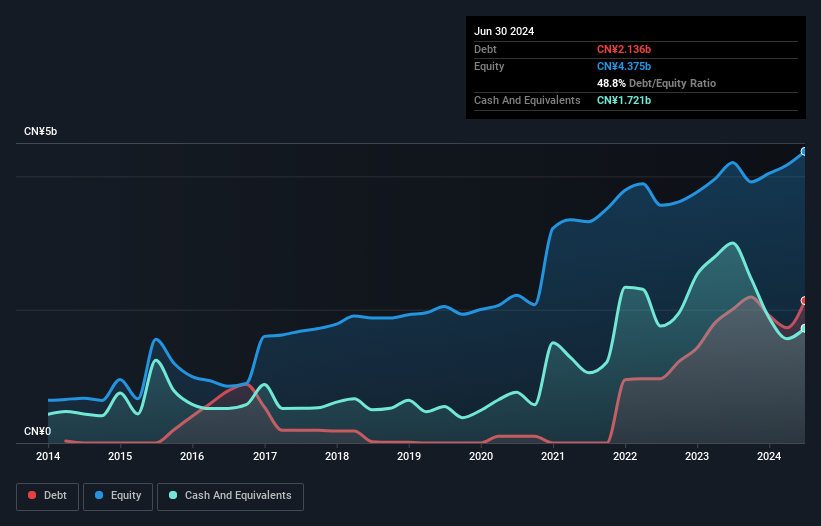Is Shanghai Bairun Investment Holding Group (SZSE:002568) Using Too Much Debt?

The external fund manager backed by Berkshire Hathaway's Charlie Munger, Li Lu, makes no bones about it when he says 'The biggest investment risk is not the volatility of prices, but whether you will suffer a permanent loss of capital.' When we think about how risky a company is, we always like to look at its use of debt, since debt overload can lead to ruin. We can see that Shanghai Bairun Investment Holding Group Co., Ltd. (SZSE:002568) does use debt in its business. But should shareholders be worried about its use of debt?
When Is Debt Dangerous?
Generally speaking, debt only becomes a real problem when a company can't easily pay it off, either by raising capital or with its own cash flow. Part and parcel of capitalism is the process of 'creative destruction' where failed businesses are mercilessly liquidated by their bankers. While that is not too common, we often do see indebted companies permanently diluting shareholders because lenders force them to raise capital at a distressed price. Of course, the upside of debt is that it often represents cheap capital, especially when it replaces dilution in a company with the ability to reinvest at high rates of return. The first thing to do when considering how much debt a business uses is to look at its cash and debt together.
View our latest analysis for Shanghai Bairun Investment Holding Group
What Is Shanghai Bairun Investment Holding Group's Debt?
The image below, which you can click on for greater detail, shows that at June 2024 Shanghai Bairun Investment Holding Group had debt of CN¥2.14b, up from CN¥2.01b in one year. However, because it has a cash reserve of CN¥1.72b, its net debt is less, at about CN¥414.6m.

How Strong Is Shanghai Bairun Investment Holding Group's Balance Sheet?
The latest balance sheet data shows that Shanghai Bairun Investment Holding Group had liabilities of CN¥1.89b due within a year, and liabilities of CN¥1.29b falling due after that. Offsetting these obligations, it had cash of CN¥1.72b as well as receivables valued at CN¥336.8m due within 12 months. So its liabilities total CN¥1.12b more than the combination of its cash and short-term receivables.
Of course, Shanghai Bairun Investment Holding Group has a market capitalization of CN¥23.7b, so these liabilities are probably manageable. But there are sufficient liabilities that we would certainly recommend shareholders continue to monitor the balance sheet, going forward.
We use two main ratios to inform us about debt levels relative to earnings. The first is net debt divided by earnings before interest, tax, depreciation, and amortization (EBITDA), while the second is how many times its earnings before interest and tax (EBIT) covers its interest expense (or its interest cover, for short). This way, we consider both the absolute quantum of the debt, as well as the interest rates paid on it.
Shanghai Bairun Investment Holding Group has a low net debt to EBITDA ratio of only 0.36. And its EBIT easily covers its interest expense, being 74.0 times the size. So you could argue it is no more threatened by its debt than an elephant is by a mouse. The good news is that Shanghai Bairun Investment Holding Group has increased its EBIT by 7.5% over twelve months, which should ease any concerns about debt repayment. When analysing debt levels, the balance sheet is the obvious place to start. But ultimately the future profitability of the business will decide if Shanghai Bairun Investment Holding Group can strengthen its balance sheet over time. So if you're focused on the future you can check out this free report showing analyst profit forecasts.
Finally, a business needs free cash flow to pay off debt; accounting profits just don't cut it. So the logical step is to look at the proportion of that EBIT that is matched by actual free cash flow. Over the last three years, Shanghai Bairun Investment Holding Group reported free cash flow worth 3.0% of its EBIT, which is really quite low. That limp level of cash conversion undermines its ability to manage and pay down debt.
Our View
Happily, Shanghai Bairun Investment Holding Group's impressive interest cover implies it has the upper hand on its debt. But the stark truth is that we are concerned by its conversion of EBIT to free cash flow. Looking at all the aforementioned factors together, it strikes us that Shanghai Bairun Investment Holding Group can handle its debt fairly comfortably. Of course, while this leverage can enhance returns on equity, it does bring more risk, so it's worth keeping an eye on this one. There's no doubt that we learn most about debt from the balance sheet. But ultimately, every company can contain risks that exist outside of the balance sheet. For example - Shanghai Bairun Investment Holding Group has 1 warning sign we think you should be aware of.
Of course, if you're the type of investor who prefers buying stocks without the burden of debt, then don't hesitate to discover our exclusive list of net cash growth stocks, today.
New: Manage All Your Stock Portfolios in One Place
We've created the ultimate portfolio companion for stock investors, and it's free.
• Connect an unlimited number of Portfolios and see your total in one currency
• Be alerted to new Warning Signs or Risks via email or mobile
• Track the Fair Value of your stocks
Have feedback on this article? Concerned about the content? Get in touch with us directly. Alternatively, email editorial-team (at) simplywallst.com.
This article by Simply Wall St is general in nature. We provide commentary based on historical data and analyst forecasts only using an unbiased methodology and our articles are not intended to be financial advice. It does not constitute a recommendation to buy or sell any stock, and does not take account of your objectives, or your financial situation. We aim to bring you long-term focused analysis driven by fundamental data. Note that our analysis may not factor in the latest price-sensitive company announcements or qualitative material. Simply Wall St has no position in any stocks mentioned.
About SZSE:002568
Shanghai Bairun Investment Holding Group
Shanghai Bairun Investment Holding Group Co., Ltd.
Excellent balance sheet and slightly overvalued.


